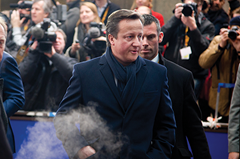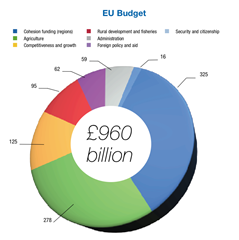Local risks in EU budget
 Cutting the EU budget has been hailed as a success for David Cameron but will restrict major funding programmes in Northern Ireland. Peter Cheney reports.
Cutting the EU budget has been hailed as a success for David Cameron but will restrict major funding programmes in Northern Ireland. Peter Cheney reports.
A new Peace IV programme is Northern Ireland’s major achievement from the EU budget negotiations but farmers and community groups are likely to face cuts in funding. The European Union’s multi-annual financial framework, for 2014-2020, has been drafted after heads of government agreed to the first real-terms cut in the budget.
The spending limit was reduced from €993 billion for 2007-2013 to €960 billion for 2014-2020: a 3 per cent decrease. €960 billion is equivalent to around
£820 billion. The largest cuts will take place in regional development funding (down €30 billion) and the Common Agricultural Policy (down €59 billion).
Those two areas account for around two-thirds of EU funding and tend to benefit peripheral regions, including Northern Ireland. Peace IV’s budget is not finalised but may reach €150 million (£128 million). Peace III, by comparison, received €225 million from EU sources.
Spending on R&D and rural development will increase. Budgets for administration, foreign policy and border security will be frozen in real terms and therefore effectively cut when inflation is factored in.
This is a success for David Cameron who was unable to secure a cut at last November’s summit. In 2011, the UK contributed a net £7.3 billion to the EU budget after its £3.6 billion rebate was deducted. UK contributions will increase but the rebate will remain intact.
The budget must be agreed unanimously. Britain was supported by other net contributors such as Sweden and the Netherlands but opposition arose from the new member states, the European Commission and European Parliament.
Enlargement is proceeding quietly but has major consequences for Northern Ireland’s future in Europe as funds will move south and east at a faster rate. The candidate and potential candidate countries are home to around 100 million people, mostly from relatively poor backgrounds.
Croatia will become the newest EU member state in July and six other Balkan countries are seeking membership. Turkey could join the EU in the next two decades and therefore become the second largest member state after Germany.
“I have been determined to cut the spending limits and so to cut the amount that Brussels can spend and, working with like-minded allies, I have achieved that today,” Cameron told reporters afterwards. “Every previous time these multi-year deals have been agreed, spending has gone up. Not this time.”
For the Irish Government, Europe Minister Lucinda Creighton said: “The deal reached today is one focused on the EU’s economic future while maintaining solidarity with less developed member states, boosting their potential for growth, employment and competitiveness.”
 The decision was taken by the European Council (a high level summit of governments) but the budget must still be approved by the European Parliament, where the four largest groups are opposed to the “austerity” deal. The Parliament’s budgetary scrutiny will continue through the remainder of 2013.
The decision was taken by the European Council (a high level summit of governments) but the budget must still be approved by the European Parliament, where the four largest groups are opposed to the “austerity” deal. The Parliament’s budgetary scrutiny will continue through the remainder of 2013.
Commission President José Manuel Barroso said that spending levels were “below what the Commission considers desirable” but pointed out that economic recovery did not depend on the budget alone.
Free trade agreements with Japan and the USA, he predicted, could increase GDP by at least 2 per cent. The Commission plans to open negotiations with both countries and Barroso says that those agreements would be “transformative not only for the European, but for the international economy.”
Closer to home, the Barroso task force has urged the Executive to build links with other regions through European networks rather than focusing on funding.
Funding warning
Local MEPs welcomed the Peace IV programme but warned that the wider cuts would affect Northern Ireland’s economic development.
The DUP’s Diane Dodds described this as “the life-blood of community work across Northern Ireland” and called for it to be focused on youth unemployment, improving skills and education under-achievement.
Dodds was disappointed with the cut in CAP spending and said that further waste could be cut by closing down the European Parliament’s seat in Strasbourg. The Parliament’s meetings have rotated between Brussels and Strasbourg since 1993. France argues for the status quo, as the city symbolises Franco-German co-operation.
Ulster Unionist MEP Jim Nicholson MEP warned that Northern Ireland would lose out. “The province looks set to receive less money from structural funds, from the Common Agricultural Policy and from a significant and serious cut to a potential Peace IV programme,” he stated. “While we will examine the proposals currently coming from Brussels, it remains to be seen whether the European Parliament will agree to this compromise that has been reached in the budget.”
Despite the budget’s size and its emphasis on R&D, Sinn Féin MEP Martina Anderson claimed that it would “do nothing to boost investment in jobs and growth and will leave member states starved of strategic investment in key areas.” She added: “We still have to analyse the detail of the budget but a first look seems to indicate the missed opportunity to re-focus it strategically in order to promote growth and jobs.”
SDLP MLA Colum Eastwood has described the Tories’ assessment of the EU as “very much an English analysis and an English experience.” He added: “The Irish experience has been one of infrastructural investment, huge advancements in agriculture, and a consistent commitment to the principles and policies of peace.”
Criticism of CAP is rare in Northern Ireland due to the importance of agriculture to the local economy. The 2010 Conservative manifesto, though, pledges to deliver “greater value for money” and the “dismantling of market-distorting subsidies” and views open markets as the main benefit of EU membership.





